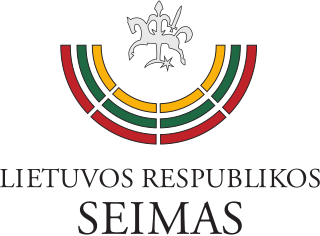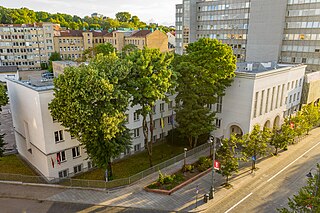
Politics of Lithuania takes place in a framework of a unitary semi-presidential representative democratic republic, whereby the president of Lithuania is the head of state and the prime minister of Lithuania is the head of government, and of a multi-party system.

Algirdas Mykolas Brazauskas was a Lithuanian politician who served as the fourth president of Lithuania from 1993 to 1998. He also served as the prime minister of Lithuania from 2001 to 2006. Brazauskas was the first democratically elected president of post-Soviet Lithuania.

The Seimas of the Republic of Lithuania, or simply the Seimas, is the unicameral legislative body of the Republic of Lithuania. The Seimas constitutes the legislative branch of government in Lithuania, enacting laws and amendments to the Constitution, passing the budget, confirming the Prime Minister and the Government and controlling their activities.

Artūras Paulauskas is a Lithuanian politician. He was the Speaker of Seimas, the parliament of Lithuania, from 2000 to 2006, and he served as Acting President of Lithuania from 6 April 2004 to 12 July 2004.

The Homeland Union – Lithuanian Christian Democrats, also colloquially known as the Conservatives, is a centre-right political party in Lithuania. It has 18,000 members and 50 of 141 seats in the Seimas. Its current leader is Gabrielius Landsbergis, who replaced Andrius Kubilius in 2015. It is a member of the European People's Party (EPP) and the International Democracy Union (IDU).

Gediminas Kirkilas was a Lithuanian politician who was Prime Minister of Lithuania from 2006 to 2008.

Laurynas Mindaugas Stankevičius was a Lithuanian economist and politician who served as the 7th Prime Minister of Lithuania from February to November 1996. He previously served as the Minister of Social Security and Labour from 1993 to 1994, and after being prime minister, was a member of the Seimas from 1996 to 1998, and later Minister of Health from 1998 to 1999. Formerly a member of the Communist Party of Lithuania, following independence he joined the newly formed Democratic Labour Party.

Constitutional Court of the Republic of Lithuania is the constitutional court of the Republic of Lithuania, established by the Constitution of the Republic of Lithuania of 1992. It began the activities after the adoption of the Law of Constitutional Court of the Republic of Lithuania on 3 February 1993. Since its inception, the court has been located in Vilnius.

Parliamentary elections were held in Lithuania on 12 October 2008, with a second round on 26 October in the constituencies where no candidate won a majority in the first round of voting. All 141 seats in the Seimas were up for election; 71 in single-seat constituencies elected by majority vote and the remaining 70 in a nationwide constituency based on proportional representation. Together with the elections, a referendum on extending the operation of Ignalina Nuclear Power Plant was held.

Presidential elections were held in Lithuania on 22 December 2002 and 5 January 2003. Incumbent President Valdas Adamkus ran for reelection alongside sixteen other candidates, the largest field of presidential candidates in the country's history. Though Adamkus held a large lead over his closest opponent, Rolandas Paksas of the Liberal Democratic Party (LDP), in the first round of the election, Paksas defeated Adamkus in the second round with 54.71% of the vote.

Presidential elections were held in Lithuania on 17 May 2009. A run-off would have been held on 7 June 2009, but was not necessary as Dalia Grybauskaitė was elected with 69% of the vote, with voter turnout just over the 50% threshold for the result to be validated. Grybauskaitė took office on 12 July as the country's first female president.

Liberals' Movement, abbr. LS, is a conservative-liberal political party in Lithuania.

Parliamentary elections were held in Lithuania in two stages on 20 October and 10 November 1996. All 141 seats in the Seimas were up for election; 70 based on proportional party lists and 71 in single member constituencies. Where no candidate gained more than 50% of the vote on 20 October, a run-off was held on 10 November.

Parliamentary elections were held in Lithuania on 8 October 2000. All 141 seats in the Seimas were up for election, 71 of them in single-seat constituencies based on first-past-the-post voting; the remaining 70, in a nationwide constituency based on proportional representation. Altogether, around 700 candidates competed in the single-seat constituencies, while over 1,100 candidates were included in the electoral lists for the nationwide constituency.
The Sixth Seimas of Lithuania was the first parliament (Seimas) elected in Lithuania after it restored independence on 11 March 1990. Elections took place on 25 October 1992, with the second round on 15 November. In a surprisingly decisive outcome, the elections were won by Democratic Labour Party of Lithuania (LDDP), with 73 seats. The result reflected widespread dissatisfaction with the economic situation and the policies of the ruling Sąjūdis political movement in the preceding Supreme Council of Lithuania.
Events in the year 2017 in Lithuania.
The Statesmen, or Statesmen Clan is a conspiracy theory which claims that a deep state of unelected officials, based in the Ministry of Foreign Affairs and the State Security Department of Lithuania (VSD), seeks to influence the actions of elected officials, protect each other in power and take control of Lithuania. The conspiracy theory emerged in 2006, after the death of VSD officer Vytautas Pociūnas in Belarus, who the theory claims was a whistleblower of the clan's activities. The conspiracy theory was promoted by politicians in the Homeland Union (TS-LKD).









